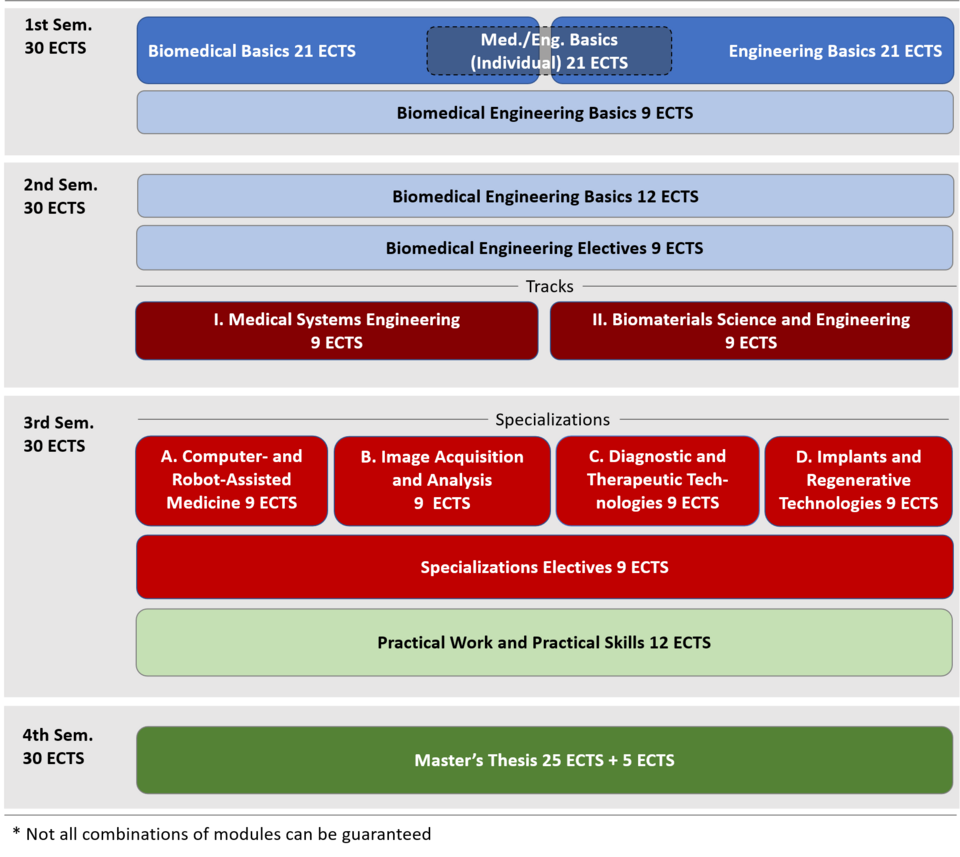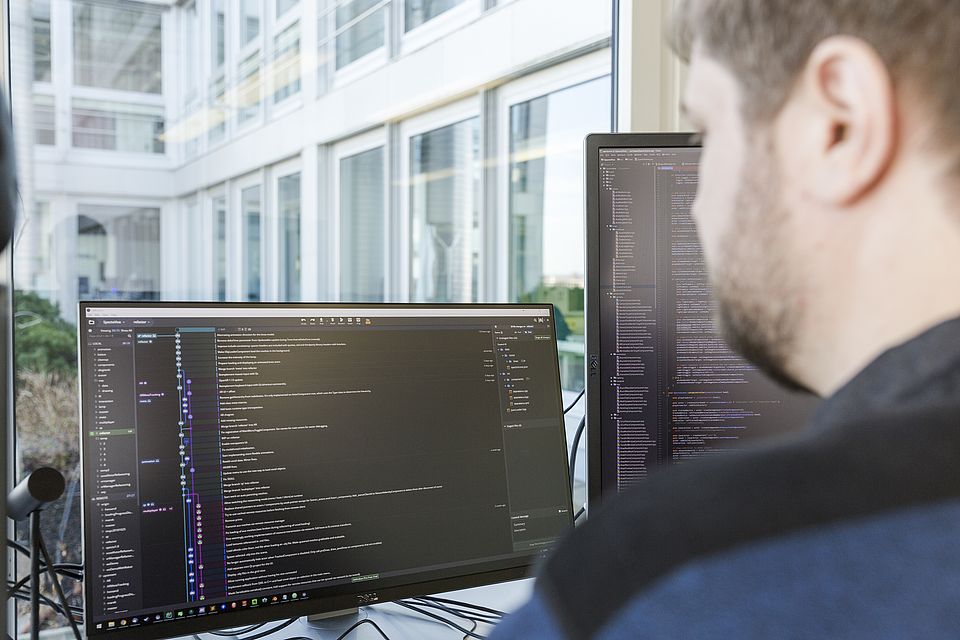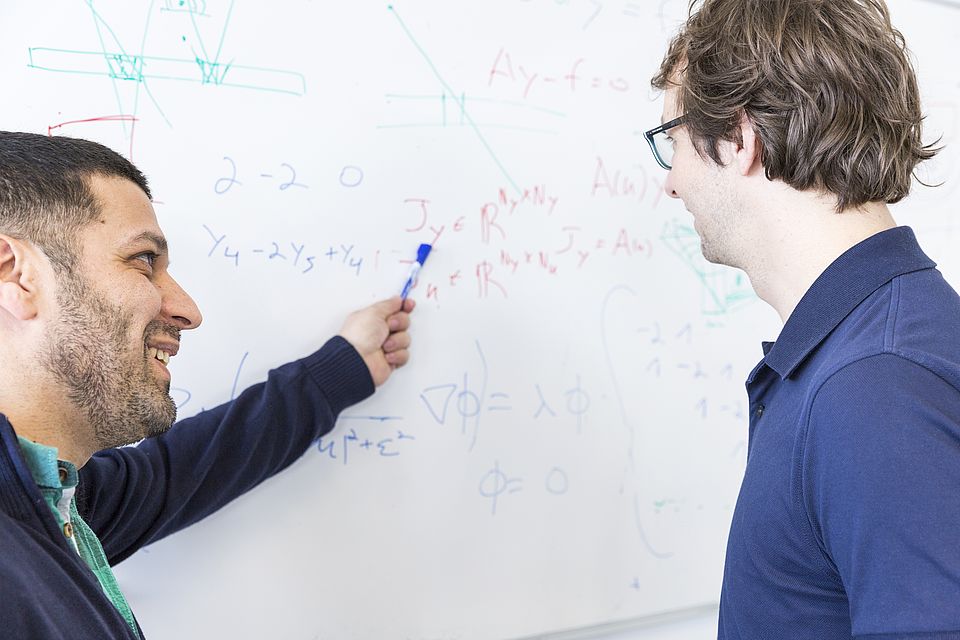Joint Degree Master Program in Biomedical Engineering
Our Joint Degree Master in Biomedical Engineering is offered by 2 institutions: The Department of Biomedical Engineering/ Medical Faculty of the University of Basel and the School of Life Sciences of the University of Applied Sciences and Arts Northwestern Switzerland (FHNW). The program takes place on site at the School of Life Sciences in Muttenz and at the University Campuses in Allschwil and Basel.
This degree is a full 4 semester program comprising 120 ETCs.
For further information can be found here or consult the study regulation of the joint Master Program in Biomedical Engineering (FHNW/Unibas) or contact us or apply here.

The programme’s content during the first semester strongly depends on each student’s individual background; thus, students with a medical background undergo a deep dive into basic engineering courses. Conversely, students with engineering or natural science backgrounds are exposed to the fundamentals of human medicine. Concurrent with this tailored education, early fundamentals of biomedical engineering are introduced.
The programme’s second semester deepens general biomedical engineering skills and knowledge up to the master’s level and puts each student on one of two study tracks: either Medical System Engineering or Biomaterial Science and Engineering. A wide range of elective courses in biomedical engineering are offered along with this.
Track I – Medical System Engineering: This track focusses on medical devices using electronics and digitalization, covering topics in the areas of signal acquisition and processing, and control theory, including general aspects of modelling and simulation in biomedical engineering. Students acquire knowledge associated with applications in diagnostics, therapeutics, computer-assisted surgeries, and imaging systems. The track sets the stage for third-semester specializations in computer-assisted surgery, image acquisition and analysis, or Diagnostic and Therapeutic Technologies.
Track II – Biomaterials Science and Engineering: This track focusses on medical devices and technologies involving mechanical or biological materials for diagnostic or therapeutic purposes. The track builds knowledge and skills in materials sciences and fabrication technologies, particularly with biological materials, all supplemented with relevant aspects of tissue-regeneration technologies. This track maps out the third semester’s emphasis on implants, regenerative technology and diagnostic and therapeutic technology.
During the third semester, the tracks progress towards our specialization foci, including Computer- and Robot-Assisted Medicine, Image Acquisition and Analysis, Diagnostic and Therapeutic Technologies, and Implants and Regenerative Technologies. All specializations are complemented with a wide range of elective courses. The third semester culminates in hands-on training in the form of a semester thesis, lab sessions and practical training. As a result, our students acquire the required skill set to move towards the master’s thesis.
Specialization A – Computer- and Robot-Assisted Medicine: Students in the Computer-Assisted Surgery module gain a comprehensive understanding of the fundamentals in developing new and existing methods for surgeons and medical staff in the complex environment of operating rooms in hospitals, e.g., the principles of surgical navigation and robotic systems, computer-assisted surgery planning, modelling, simulation and execution by smart tools, robots and visualization systems. Course topics include:
- Computer-assisted surgery
- Medical Robotics
- MR Imaging
- Deep Learning
Specialization B – Image Acquisition and Analysis: This module focusses on advanced imaging techniques, e.g., magnetic resonance, ultrasound, X-ray, computer tomography and infrared photography applied in dental offices, hospitals and forensic institutes. Students will gain insights into the development and application of medical imaging techniques and image analysis, as well as the use of artificial intelligence (AI) to improve therapy monitoring (i.e., radiotherapy) for personalised adaptive therapy or for automated approaches in image acquisition and analysis in hospitals or forensics.
Course topics include:
- Digital Dentistry
- Magnetic Resonance Imaging
- Forensic Imaging Methods
Specialization C – Diagnostic and Therapeutic Technologies: This specialization delves deeper into electronic and digital medical devices for specific clinical applications, e.g., neural and deep brain stimulation, brain-computer interfaces, hearing diagnostics (audiology), hearing rehabilitation (e.g., cochlear implants and hearing aids) and biomechanical tracking systems for functional anatomy and gait analysis. Students learn about diagnostics, bioelectrical and other natural signal sources, digital signal analysis and therapeutic stimulation. Course topics include:
- Biomedical Acoustics
- Neurotechnologies
- Clinical Biomechanics
Specialization D – Implants and Regenerative Technologies: This module focusses on the design and manufacture of medical implants and surgical tools by considering their bulk and surface properties, as well as the characterization of tissues.
It encompasses a broad range of design, additive and conventional manufacturing and characterization starting at the macroscopic level, to examine device properties, all the way down to the atomic level to identify associations between the nanostructure and function. Regenerative medicine will foster and generate interdisciplinary scientific discoveries and development of advanced therapeutic strategies. Topics include biomaterial-based control of stem cell function; engineering technologies for tissue and smart implant manufacturing, e.g., additive manufacturing and bioprinting; and translational challenges towards industrial exploitation, regulatory requirements and clinical implementation. Course topics include:
- Regenerative Surgery
- Materials Science and Biomaterials
- Characterizing Materials in Medicine (biocompatibility, micro- and nanostructuring)
- Bio-interface Engineering
- Implant Design and Manufacturing
Each specialization is accompanied by a certain number of elective courses, either within the same field of specializations or from other fields, depending on students’ individual interests.
The fourth semester is devoted to the master’s thesis, in which students work independently on a scientific project of their choice, supervised by our professors. The thesis culminates in a public master examination.
Student with a Bachelor's degree in a medical, natural science or engineering discipline may apply. See here below Bachelor degree programs that we will admit:
| Medicine Bachelors | Natural Science Bachelors | Engineering Bachelors |
| Dentistry | Biochemistry, Biology, Biotechnology | Civil Engineering |
| Health Sciences and Technologies | Chemistry | Mechanical Engineering |
| Human Medicine | Computational Sciences, Data Science | Chemical Engineering |
| Pharmacy | Computer Science | Electrical Engineering |
| Sport, Exercise and Health | Digital Life Sciences, Life Sciences and Technologies | Systems Engineering |
| Biomedical Sciences | Materials Science | |
| Mathematics | ||
| Medical Informatics | ||
| Micro and Medical Technology | ||
| Mobile Robotics | ||
| Nanosciences | ||
| Physics | ||
| Photonics |


